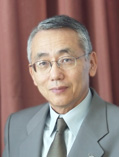Secretary-General
Yoshio UTSUMI
Mr Yoshio Utsumi worked in the Japanese government for over thirty
years and has a proven track record of expertise in telecommunications
at senior policy levels gained both nationally and internationally.
After earning a Bachelor degree of Law from the University of Tokyo
and a Master of Arts in Political Science from the University of
Chicago, Mr Utsumi joined the Ministry of Posts and Telecommunications (MPT)
where he held a number of senior policy-making level positions. In 1972,
he was nominated professor of public administration at the MPT Postal
College. From 1986, he led Japanfs largest investment fund at MPTfs
Postal Life Insurance Bureau until 1988, when he moved to broadcasting
as the Head of the General Affairs Division of MPTfs Broadcasting
Bureau. He later joined MPTfs Communications Policy Bureau, where he
helped shape Japanfs domestic policies. Before joining ITU, his
experience in international affairs included three years in Geneva,
where he served as First Secretary of the Permanent Mission of Japan in
charge of ITU affairs and two years as Director-General of International
Affairs of the Ministry of Posts and Telecommunications. In 1994, he was
elected Chairman of the ITU plenipotentiary conference. At the senior
policy-making level, he served as MPT Director-General and Deputy
Minister.
Mr Utsumi is credited with having introduced the competition and
liberalization policy at a time when such ideas were not widely
accepted. His initiative led to Japanfs first reform of its
telecommunication market. He was also a major driving force in many of
Japanfs most important projects to develop multimedia industries. In the
postal sector, he undertook a major restructuring of Japanfs postal
services, which he carried out skillfully and successfully with the
cooperation of 200 000 staff at every level. On the international scene,
Mr Utsumi has played a very active role in many negotiations, and in
particular, those leading to the historic WTO agreement on basic
telecommunications.
Elected in 1998 as Secretary-General of ITU, he was re-elected for a
second term in 2002.
During his two mandates, Mr Utsumi led the successful organization of
the two phases of the World Summit on the Information Society (WSIS)
resulting in the adoption of the Geneva Declaration of Principles, the
Geneva Plan of Action, the Tunis Commitment and the Tunis Agenda for the
Information Society which, together, provide a common understanding and
vision on the way to shape the emerging information society so that it
be inclusive, people-centered and equitable. A combined total of more
than 30 000 people, including around 100 Heads of State and Government,
took part in the two phases of the Summit. The Summit recognized the
fundamental role of information and communication technologies (ICT) in
shaping our future, and world leaders committed to building an
information society by 2015, based on agreed principles and a clear
roadmap. Through this process, ITU has asserted its leading role in the
broader domain of the information society.
Under his leadership, reforms were introduced that led to a more
efficient and effective organization, producing cost-savings equivalent
to CHF 75 million out of a total budget of CHF 335 million on average
per biennium. Highlights of his major achievements include the
introduction of operational planning, results-based budgeting and
time-tracking across the organization resulting in a substantial
overhaul of the organization. He implemented cost-recovery measures in
satellite filings and cost-saving measures in the areas of publication
production and in working methods while creating new sources of revenue.
These measures led to a reduction in the contributions to be paid by
members, despite growing demands and cost increases.
From a strategic perspective, Mr Utsumi successfully refocused ITU as
a policy-oriented organization by introducing new issues to ensure its
continuing relevance, with landmark activities such as the New
Initiatives Programme and the Global Symposium for Regulators. He also
strengthened the role of ITU in the coordination of policy issues among
Member States, particularly through workshops, country case study
research and analysis reports. Through the WSIS process, ITU gained a
clear role in the implementation of the WSIS Plan of Action, as part of
a multi-stakeholder approach.
Under his tenure, ITU was made more attractive to the private sector:
measures that responded to the demands for a lean, efficient and
responsive organization offering a wider portfolio of more relevant
services were introduced. These measures led to a 19 percent increase in
private sector membership and a recommitment of the private sector to
the work of ITU.
He also succeeded in strengthening ITUfs public presence,
particularly through increased public visibility in the media.
Mr Utsumi was born on 14 August 1942. He and his wife Masako, an
architect, have a son and a daughter.
|
